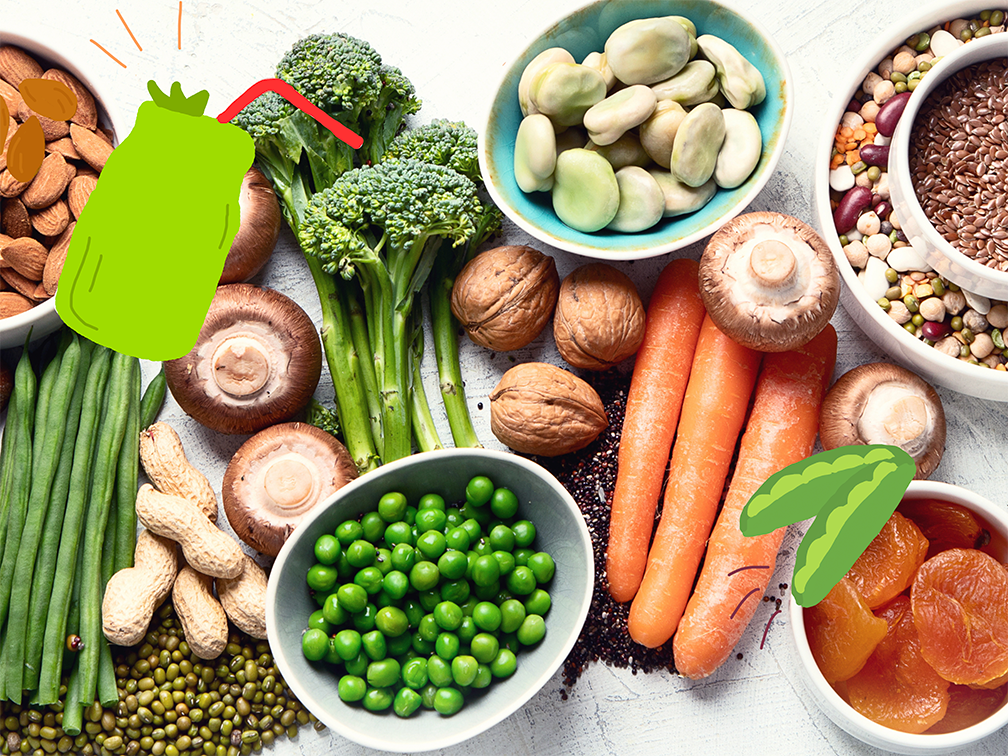In recent years, there has been a significant shift toward plant-based diets, with more people embracing the health and environmental benefits of consuming less meat and more plant-derived foods. Central to this movement is plant-based protein, a versatile and nutritious component that can play a vital role in a balanced diet.
What is Plant-Based Protein?
Plant-based proteins are proteins derived from plant sources such as legumes, grains, nuts, seeds, and certain vegetables.
Unlike animal proteins, which come from meat, dairy, and eggs, plant proteins offer a variety of nutrients and are often accompanied by dietary fiber, antioxidants, vitamins, and minerals.
Health Benefits of Plant-Based Proteins
Heart Health
Consuming plant-based proteins can contribute to better heart health. They are typically low in saturated fat and free of cholesterol, which are associated with an increased risk of heart disease.
Foods like beans, lentils, and whole grains also contain soluble fiber, known to help lower LDL cholesterol levels.
Muscle Growth and Recovery
Rice and pea proteins are rich in essential amino acids necessary for muscle growth and repair.
They are especially popular among athletes and fitness enthusiasts seeking plant-based protein supplements that support muscle recovery and development.
Lower Risk of Type 2 Diabetes
Diets rich in plant-based proteins have been linked to a reduced risk of developing type 2 diabetes.
The high fiber content improves blood sugar control, and the low saturated fat content supports insulin sensitivity.
Digestive Health
The fiber in plant proteins supports a healthy digestive system by promoting regular bowel movements and fostering a beneficial gut microbiome.
This can lead to improved nutrient absorption and overall gastrointestinal health.
Environmental Benefits
Reduced Carbon Footprint
Plant-based proteins generally require fewer resources to produce than animal proteins. They emit fewer greenhouse gases, making them a more sustainable choice contributing less to climate change.
Conservation of Water and Land
Cultivating plant proteins uses less water and land compared to raising livestock. This efficiency helps preserve natural habitats and reduces the strain on essential resources.
Ethical Considerations
Choosing plant-based proteins can align with ethical concerns regarding animal welfare. Reducing or eliminating animal products from one’s diet decreases demand for factory farming practices, often associated with animal cruelty.
Common Sources of Plant-Based Proteins
Legumes: beans (black, kidney, pinto), lentils, chickpeas.
Whole grains: quinoa, brown rice, oats.
Nuts and seeds: almonds, chia seeds, hemp seeds.
Soy products: tofu, tempeh, edamame.
Others: seitan (made from wheat gluten), nutritional yeast, plant-based protein powders (pea protein, rice protein).
Pea protein is extracted from yellow split peas, pea protein is rich in branched-chain amino acids (BCAAs) that support muscle health. It’s highly digestible and free from common allergens like gluten and soy.
Incorporating Plant-Based Protein into Your Diet
Breakfast Ideas
- Overnight oats with chia seeds and almond milk
- Tofu scramble with vegetables
Tip to increase protein intake: add rice or pea protein powder to your smoothies for a protein boost. Blend with fruits, vegetables, and plant-based milk for a nutritious drink.
Lunch Options
- Quinoa salad with mixed veggies and chickpeas
- Lentil soup with whole-grain bread
Dinner Suggestions
- Stir-fried tofu with brown rice and broccoli
- Black bean burritos with avocado and salsa
Tip to increase protein intake: stir in pea protein powder into soups and stews. It dissolves easily and doesn’t significantly alter the taste, adding a protein punch to your meals.
Snacks
- Hummus with carrot sticks
- Trail mix with nuts and dried fruit
- Energy balls: combine rice or pea protein powder with dates, nuts, and seeds to make no-bake energy balls.
- Protein pudding: mix the protein powder with dairy-free yogurt or mashed avocado for a creamy snack.
Addressing Common Concerns
Complete Proteins
While some plant proteins are incomplete (lacking one or more essential amino acids), consuming various plant foods throughout the day can provide all the necessary amino acids your body needs.
Nutrient Considerations
- Vitamin B12: typically found in animal products, so consider fortified foods, nutritional yeast, or supplements if following a strict plant-based diet.
- Iron: plant sources are abundant (spinach, lentils), but pairing them with vitamin C-rich foods enhances absorption.
Digestibility
Rice and pea proteins are known for their high digestibility. They are gentle on the stomach and suitable for people with dietary sensitivities or soy, dairy, or gluten allergies.
Plant-based protein… In short
Plant-based proteins offer many health benefits, support environmental sustainability, and align with ethical considerations regarding animal welfare.
By incorporating a variety of plant proteins into your diet, you can enjoy delicious meals while contributing to your overall well-being and the planet’s health.
Whether you’re looking to fully adopt a plant-based diet or simply want to reduce your meat consumption, embracing plant-based proteins is a positive step toward a healthier lifestyle.
